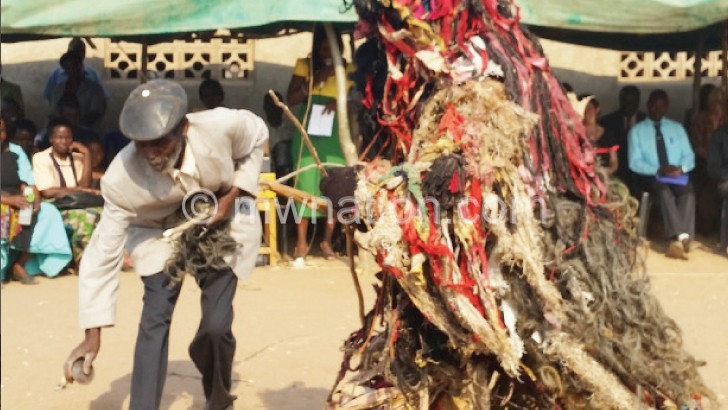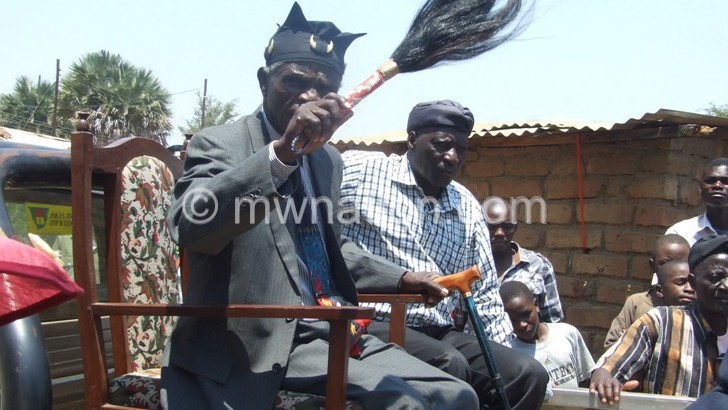Being the king’s beauty
She is beauty—literally!
Call his man a culture warrior. M’mbelwa V seems to have found a way to rejuvenate the Ngoni way of living apart from just what Malawians witnessed at his wedding last week.
Ignore that the crown prince is an heir to the highest throne in a kingdom that has almost lost its unique language—a tribe which has sacrificed its mother tongue in exchange for Tumbuka and other languages widespread in its vicinity.
For the rising to the throne left by his fallen father Inkosi ya Makosi M’mbelwa IV, his wedding to Beauty Munthali was not only a pure thrill, but walking the walk he envisages as the newest blood at the pinnacle of the Jere Ngonis.
From a mere talk just hours before his wedding begun in earnest, we asked the king of kings what value he brings to the chieftaincy well known for taking sides with ruling parties.
Born Mkhosi Jere in 1986, the just married monarch bellowed: “I want to uphold Ngoni culture. It is very sad that most of the youth have departed from their culture.”
It is such tough talk that makes every chief a custodian of culture.
But for the youthful ruler, his wedding was a marriage of culture and religion.
The stage was set on Friday, ready for President Joyce Banda. Just as the sun was set, the new chief retreated into obscurity.
Amid songs from royal soldiers, termed impi, we saw an army of elderly women and one man, presumably an uncle, escort the king’s Beauty into the murky world of cows—a nearby kraal.
Venturing coyly into what the Ngonis call chibaya, she poured a pinch of powdered tobacco on the hands of the Jere elders, her in-laws, from a fuko.
Elsewhere, the bride’s people and the groom’s smoke from the same pipe, but at Edingeni, they all had a sniff from the same minute bottle.
“This is just one in a series of ceremonies cementing the relationship between the newlyweds’ families,” said organising committee spokesperson Moses Mkandawire of the cultural affair which left onlookers wondering: “where is the man?”
Do not mind that the president had summoned all Mzimba chief’s for an eleventh hour meeting at Mzuzu State Lodge.
The groom was at home; awaiting the time his love would emerge from the beastly world and venture into his happy mother’s home.
The chiefs are allowed to marry as many wives as they desire, a clause inserted into the tribes’ treaty with early missionaries who settled at Embangweni.
However, elders say it is only the Inkosikazi, the queen, who steps into the cattle kraal that will mother the next M’mbelwa, a paramount chief in the vast district.
Gazing at the sight, we asked elders why the groom was nowhere in sight if the ceremony is that important.
In their own words, it is in their royal ways of life that a woman marries not her husband, but a whole family.
According to T/A Mtwalo, this cultural half of the royal wedding marked the signing of an inalienable contract with elders of the royal clan.
Inkosi Mtwalo preferred calling M’mbelwa V’s bride “mother of the whole tribe.”
“Every king needs a home. The woman is the home. When visitors want water, it is her responsibility to make them feel at home, pass the water and show that she is at their service,” says Mtwalo.
This reasoning could be classified as canonisation of myths that hold women domestic workers. But he says it was just culture in action.
In line with tradition, the bride left the kraal and headed to her mother-in-law’s house with her kitchenware—pots, mthiko, dengu and chitete—on her head.
This was Friday, the eve of the white wedding at Edingeni CCAP church where the Reverend Dr Timothy Mvula pronounced the two sweethearts husband and wife as Vice-President Khumbo Kachali looked on with a suppressed smile that seemingly said: “congratulations”.
But even the day the Livingstonia Synod Moderator had set aside to bless the wedding started a cultural high—with the bride’s mother and the groom’s going to the kraal once again, this time to exchanging cows in a ceremony called Mqonda which further cements their newly forged ties.
“Im the happiest woman in the world not only because Mkhosi is my first born, but because this places a huge responsibility on his shoulders. He has been the head of the family ever since M’mbelwa died in February last year. Now he has to take care of the whole tribe,” said her mother Josophine in an interview.
It was therefore no surprise that Ngoni dressing, dances and personalities were a common fixture outside the church where the two did the needful at the hands of an army of clergymen. Yet the artefacts of western culture were glaring on the Christian side of the love story—the veiled bride with her exquisitely dressed bridal party and a besuited groom exchanging rings amid songs spiced by keyboards, not the traditional drum.
It is a requisite that every Ngoni should be married before he ascends to the throne, says Mtwalo.
His counterpart T/A Mabulabo bills the wedding a once-in-a-lifetime occasion because it is not every day that Inkosi ya Makosi weds.
“Some of us may never live to witness another Inkosi ya Makosi’s wedding. The Ngonis of Mzimba have a home and a leader,” said the chief exemplifies the young blood along with M’mbelwa V.
But when all is said and done, this was not a wedding like any other, but what Mkandawire termed it: A king and a queen tying a knot in spectacular fashion.





